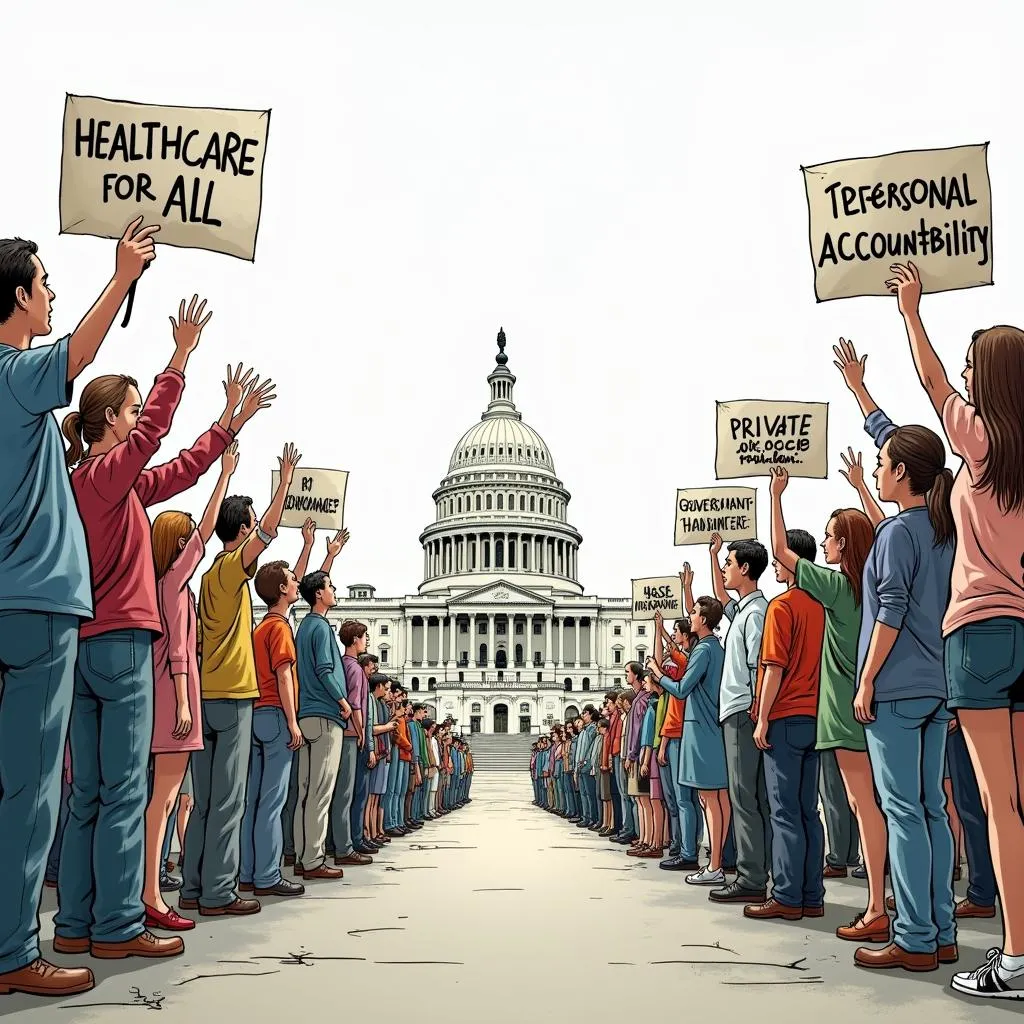The topic of universal healthcare has been a recurring theme in IELTS Writing Task 2 exams, appearing with moderate frequency in recent years. Given its global relevance and the ongoing debates surrounding healthcare systems worldwide, it’s likely to remain a popular subject for future tests. Let’s examine a specific question related to this theme that has appeared in past IELTS exams:
Nội dung bài viết
Some people believe that governments should provide free healthcare for all citizens, while others think individuals should be responsible for their own health and medical costs. Discuss both views and give your own opinion.
Analysis of the Question
This question requires candidates to:
- Discuss the view that governments should provide free healthcare for all citizens
- Discuss the opposing view that individuals should be responsible for their own health and medical costs
- Provide their own opinion on the matter
It’s crucial to address all parts of the question to achieve a high band score. Let’s look at sample essays for different band scores, starting with a Band 8-9 level response.
Band 8-9 Sample Essay
Healthcare provision is a contentious issue in many countries, with some advocating for government-funded universal healthcare while others believe individuals should bear the responsibility for their medical expenses. In my opinion, while personal responsibility for health is important, governments should play a significant role in ensuring access to healthcare for all citizens.
Proponents of universal healthcare argue that it is a fundamental human right and should be accessible to everyone regardless of their financial status. They contend that a healthy population is more productive and contributes more to the economy, ultimately benefiting society as a whole. Moreover, government-funded healthcare can lead to better preventive care, reducing long-term healthcare costs and improving overall public health. Countries like the United Kingdom and Canada have successfully implemented universal healthcare systems, demonstrating that it is feasible and beneficial.
On the other hand, those who support individual responsibility for healthcare costs argue that it promotes personal accountability for one’s health choices. They believe that when people are financially invested in their healthcare, they are more likely to make healthier lifestyle choices and use medical services judiciously. Additionally, critics of universal healthcare often cite concerns about the quality of care, long waiting times, and the potential for increased taxes to fund such systems.
While both perspectives have merit, I believe that the benefits of government-provided healthcare outweigh the potential drawbacks. A balanced approach that combines universal access with personal responsibility could be the most effective solution. Governments could provide basic healthcare coverage for all citizens, ensuring that essential medical services are accessible to everyone. This could be supplemented by optional private insurance for those who desire additional coverage or faster access to certain treatments.
Furthermore, governments can implement health education programs and incentives to encourage personal responsibility for health, such as tax breaks for maintaining a healthy lifestyle or participating in preventive care programs. This approach would address the concerns of both sides of the argument, promoting individual accountability while ensuring that no one is denied necessary medical care due to financial constraints.
In conclusion, while personal responsibility for health is important, I believe that governments have a crucial role to play in providing universal healthcare. A hybrid system that combines government-funded basic coverage with incentives for personal health management could lead to a healthier, more productive society and reduce overall healthcare costs in the long run.
 Universal healthcare debate illustration
Universal healthcare debate illustration
Explanation of Band 8-9 Score
This essay would likely receive a Band 8-9 score for the following reasons:
-
Task Achievement: The essay fully addresses all parts of the task, discussing both views and clearly stating the writer’s opinion.
-
Coherence and Cohesion: The essay is well-organized with clear paragraphing and effective use of cohesive devices.
-
Lexical Resource: The essay demonstrates a wide range of vocabulary used accurately and appropriately.
-
Grammatical Range and Accuracy: The essay uses a variety of complex sentence structures with a high degree of accuracy.
-
Development of Ideas: Ideas are fully developed with relevant examples and explanations.
Now, let’s examine a Band 6-7 level response to the same question.
Band 6-7 Sample Essay
Healthcare is an important issue in many countries. Some people think the government should provide free healthcare for everyone, while others believe individuals should pay for their own medical costs. This essay will discuss both views and give my opinion.
Those who support free healthcare for all citizens say it is a basic right. They think everyone should have access to medical treatment, no matter how much money they have. This can help prevent serious health problems in society and make the country more productive. For example, in countries like the UK, people can see a doctor without worrying about the cost.
On the other hand, some people argue that individuals should be responsible for their own health and medical expenses. They believe this will make people take better care of themselves and not waste medical resources. Also, they think private healthcare can be better quality and have shorter waiting times. In countries like the USA, many people have private health insurance through their jobs.
In my opinion, I think the government should provide basic healthcare for all citizens, but people should also take some responsibility for their health. The government could offer free or low-cost healthcare for essential treatments, while people could pay extra for non-essential services. This way, everyone can get the care they need, but there is also an incentive to stay healthy.
To conclude, both free healthcare and individual responsibility have their advantages. A mix of both approaches might be the best solution to ensure everyone has access to healthcare while encouraging people to take care of their health.
Explanation of Band 6-7 Score
This essay would likely receive a Band 6-7 score for the following reasons:
-
Task Achievement: The essay addresses all parts of the task, but the discussion of both views and the writer’s opinion could be more fully developed.
-
Coherence and Cohesion: The essay is generally well-organized, but the use of cohesive devices is less sophisticated than in the Band 8-9 essay.
-
Lexical Resource: The essay uses an adequate range of vocabulary, but lacks the precision and sophistication of higher band scores.
-
Grammatical Range and Accuracy: The essay uses a mix of simple and complex sentence structures with generally good accuracy, but lacks the variety and control seen in higher band scores.
-
Development of Ideas: Ideas are relevant and supported, but could be more fully elaborated with examples and explanations.
 Balancing healthcare responsibility
Balancing healthcare responsibility
Key Vocabulary to Remember
-
Universal healthcare (noun): A system where all residents of a country are assured access to healthcare.
Pronunciation: /ˌjuːnɪˈvɜːsl ˈhelθkeə(r)/ -
Contentious (adjective): Causing or likely to cause disagreement or argument.
Pronunciation: /kənˈtenʃəs/ -
Preventive care (noun): Healthcare that focuses on preventing illness and maintaining well-being.
Pronunciation: /prɪˈventɪv keə(r)/ -
Judiciously (adverb): With good judgment or sense.
Pronunciation: /dʒuːˈdɪʃəsli/ -
Feasible (adjective): Possible and practical to do easily or conveniently.
Pronunciation: /ˈfiːzəbl/ -
Incentive (noun): Something that encourages a person to do something.
Pronunciation: /ɪnˈsentɪv/ -
Hybrid system (noun): A system that combines elements of two or more different approaches.
Pronunciation: /ˈhaɪbrɪd ˈsɪstəm/ -
Accountability (noun): The fact or condition of being accountable; responsibility.
Pronunciation: /əˌkaʊntəˈbɪləti/
To conclude, the topic of universal healthcare is likely to remain relevant in IELTS Writing Task 2 exams. Other potential questions on this theme might include:
- Do the benefits of universal healthcare outweigh the costs to governments and taxpayers?
- Should developing countries prioritize universal healthcare over other development goals?
- How can countries balance the provision of public healthcare with the need for medical innovation typically driven by private companies?
To practice, try writing your own essay on one of these topics or the original question discussed in this article. Feel free to share your essay in the comments section for feedback and discussion. Remember, regular practice is key to improving your IELTS Writing skills!


